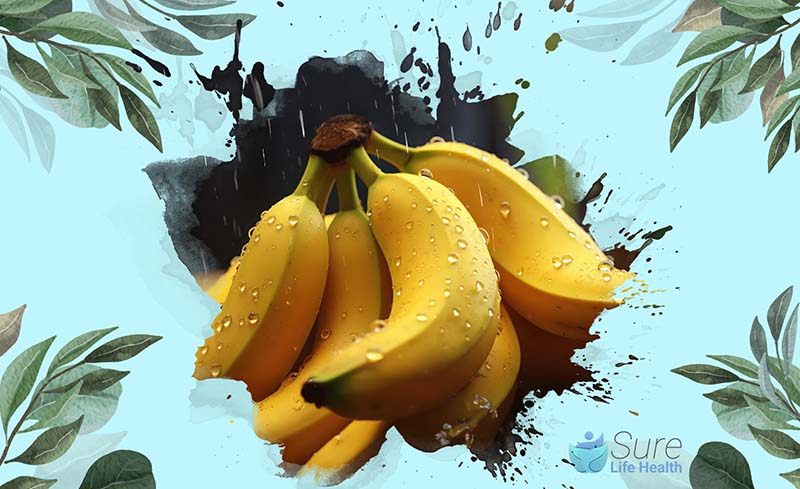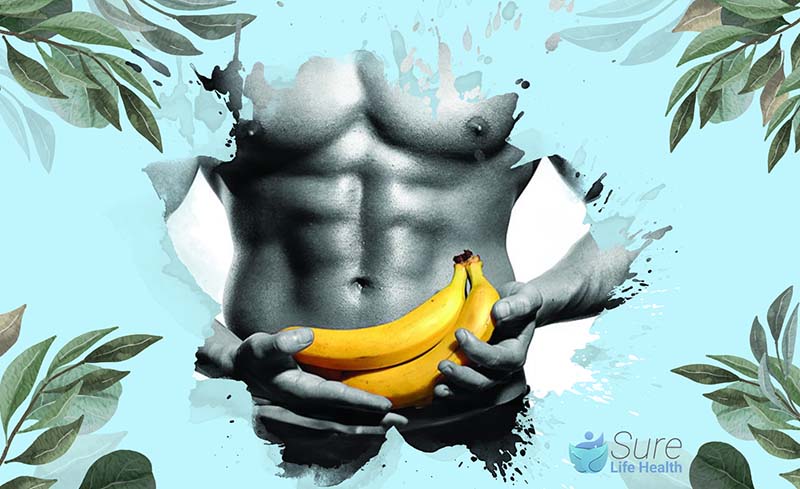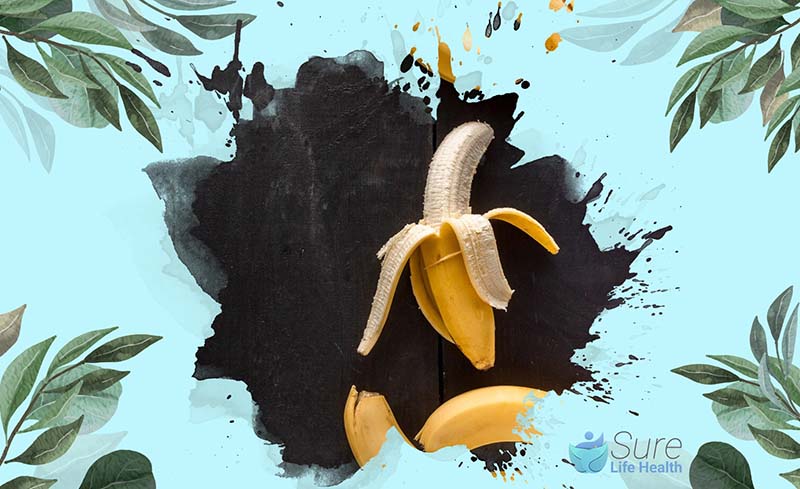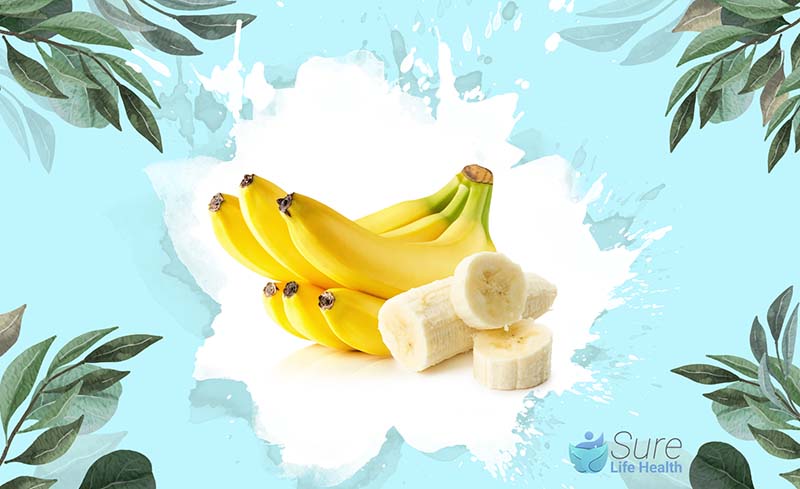Are Bananas Bad for Testosterone? Often hailed as a superfood, bananas are not just a tasty snack; they’re packed with essential vitamins and minerals that are crucial for staying healthy.
Loaded with Vitamin C, great for the immune system, and potassium, which helps maintain healthy blood pressure, bananas offer more than meets the eye.
They also assist in controlling sodium levels, benefiting heart health, and their fiber content supports digestion. Economical and easy to integrate into any diet, bananas are a versatile food choice.
Moreover, consuming bananas regularly, particularly in conjunction with exercise, might influence testosterone levels positively, providing a myriad of health and energy benefits.
Are Bananas Good for Testosterone?
Contrary to any misconceptions, bananas are not detrimental to testosterone levels; in fact, they can actually be quite beneficial. Bananas are rich in essential nutrients such as magnesium, bromelain, potassium, and vitamins B6 and C, all of which play roles in supporting testosterone production and upkeep.
Magnesium, abundantly found in bananas, is a critical component in the production of testosterone, contributing to its healthy levels within the body. Meanwhile, bromelain, another compound in bananas, aids in the regulation of testosterone levels and has been associated with potential increases in sperm count.
Furthermore, the array of vitamins and minerals present in bananas promotes overall health and well-being, indirectly fostering an environment conducive to optimal testosterone levels.
In conclusion, including bananas in your diet can be a wise choice not only for maintaining testosterone levels but also for supporting your overall health and vitality.

How Bananas Help Increase Testosterone
Bananas are packed with a wealth of essential vitamins, minerals, and nutrients, all conveniently contained within one fruit. This nutritional powerhouse not only addresses various health concerns but also plays a significant role in boosting testosterone levels.
One key component found in bananas is bromelain, a natural enzyme that has shown promise in increasing testosterone levels. Additionally, the presence of Vitamin B6 and Vitamin C in bananas supports the proper functioning of the brain and nerves, which in turn regulate hormone production, including testosterone.
Furthermore, bananas boast a high potassium content, which plays a crucial role in maintaining optimal levels of sodium in the blood—an important factor in hormone regulation.
With this impressive combination of nutrients and more, bananas emerge as a stellar natural option for stimulating testosterone production and promoting overall health.

Other Benefits of Eating Bananas
Maintaining overall health is crucial for healthy testosterone production, and bananas play a pivotal role in supporting various bodily functions. Here are some additional ways bananas contribute to overall well-being:
Improve Kidney Function
Bananas are rich in potassium, a mineral essential for optimal kidney function.
Regular consumption of bananas has been associated with a reduced risk of kidney disease, with studies indicating that individuals who eat bananas several times per week are significantly less likely to develop kidney issues.
Strengthens The Immune System
The Vitamin B6 content in bananas aids in hemoglobin production, a protein crucial for red blood cell function.
Adequate levels of hemoglobin are vital for preventing anemia and bolstering immune system defenses.
Additionally, bananas boast high levels of antioxidants, further enhancing immune system resilience.
Helps Lower Blood Pressure
Potassium and magnesium, abundant in bananas, play key roles in maintaining healthy blood pressure levels and heart function. By increasing potassium intake, bananas help regulate sodium levels, reducing the risk of heart disease.
Moreover, their low Glycemic Index makes them a suitable choice for managing blood sugar levels, potentially benefiting individuals with type 2 diabetes.
Improve Digestion
Bananas are an excellent source of dietary fiber, promoting digestive health with approximately 3 grams of fiber per fruit. Under-ripe bananas contain resistant starch and pectin, which support beneficial gut bacteria and may lower the risk of colon cancer.
Reduce Stress
Vitamin C, found abundantly in bananas, is associated with the regulation of cortisol, often referred to as the “stress hormone.” Inadequate Vitamin C levels can lead to increased cortisol production, subsequently lowering testosterone levels. By providing ample Vitamin C, bananas aid in cortisol regulation, contributing to lower stress levels and potentially allowing for increased testosterone production.
Incorporating bananas into your diet not only supports healthy testosterone levels but also enhances overall health and vitality through these diverse benefits.

How Many Bananas a Day to Increase Testosterone?
Adding bananas to your daily diet can be a simple and effective way to support testosterone levels. For a healthy individual, consuming one to two bananas a day, depending on their size, is considered safe and beneficial.
Bananas are rich in essential nutrients such as bromelain, potassium, vitamin B6, and magnesium, all of which play key roles in supporting testosterone production. Regular consumption of bananas can help maintain and even boost testosterone levels due to the presence of these vital nutrients.
To reap the testosterone-boosting benefits of bananas without overconsumption, it’s advisable to incorporate them as part of a balanced diet. By enjoying bananas in moderation alongside other nutritious foods, you can harness their potential to support overall health and vitality.

Do Bananas Kill Your Testosterone?
Contrary to any misconceptions, bananas do not have a detrimental effect on testosterone levels. In fact, they can be quite beneficial in this regard. Bananas are packed with essential nutrients like bromelain, potassium, vitamin B6, and magnesium, all of which contribute to supporting and potentially boosting testosterone levels.
Among these nutrients, bromelain stands out for its role in facilitating testosterone production and promoting overall health. Therefore, far from harming testosterone levels, incorporating bananas into your diet can be a wise choice for maintaining and even enhancing them.
Conclusion
Bananas, renowned for being a powerhouse of essential nutrients, are not bad for testosterone. In fact, their rich nutritional profile directly or indirectly supports testosterone levels. Regularly incorporating bananas into your diet can yield positive effects on testosterone production without any adverse effects.
However, it’s essential to recognize that no single food, including bananas, alone can fully regulate testosterone health. A well-planned diet and a healthy lifestyle are key components in maintaining hormonal balance.
By ensuring adequate intake of all the essential vitamins and minerals found in bananas, you can enhance your body’s ability to produce testosterone and promote overall well-being. Thus, the question “Are bananas bad for testosterone?” can be answered with a clear no; they can actually be beneficial as part of a balanced diet.
Be sure to explore more insightful blogs from Sure Life Health, where we continue to shed light on the latest trends and breakthroughs in health and wellness.
Professor Gaye Cunnane, PhD, MB, FRCPI
As the Director of Health and Wellbeing at RCPI, Professor Gaye Cunnane is at the helm of initiatives aimed at enhancing the health and well-being of RCPI Trainers and Trainees. Her role extends beyond administration; she is also a respected clinical professor of rheumatology and a consultant rheumatologist at Trinity College Dublin (TCD) and St James’s Hospital. Prof. Cunnane’s medical journey began at TCD, where she graduated from medical school, and her path has been marked by both clinical and academic excellence.
After completing her basic clinical training in medicine, she embarked on PhD studies at University College Dublin and St Vincent’s University Hospital. Her research during this period was focused on prognostic markers in early inflammatory arthritis, a project that saw her collaborating with esteemed universities across Europe, including in Switzerland, The Netherlands, the UK, and Sweden.
Prof. Cunnane’s career took her to the University of California, San Francisco, where she spent three years delving into research on new treatments for lupus. Her academic prowess led her to the University of Leeds in 2001 as a senior lecturer, before returning to Ireland in 2003 to assume her current roles. She has also served as the National Specialty Director for Rheumatology training in Ireland, Programme Director for Basic Specialist Training with RCPI, and as a past President of the Irish Society for Rheumatology.
PUBLISHED ARTICLES
“Rheumatic disease differentiation using immunoglobulin G sugar printing by high-density electrophoresis”: Published in The Journal of Rheumatology, this study reflects her in-depth investigation into rheumatic diseases.
“Benefits of exercise in patients with rheumatoid arthritis: a randomized controlled trial”: This research work, highlighting the positive impact of exercise on rheumatoid arthritis, underscores Prof. Cunnane’s dedication to practical, patient-centered research.
Additionally, Prof. Cunnane has made notable contributions to the Annals of the Rheumatic Diseases, discussing early referral, diagnosis, and treatment of rheumatoid arthritis. She has also been involved in a study on the NCBI platform investigating exercise benefits in rheumatoid arthritis patients.
Professor Gaye Cunnane’s career is a testament to her commitment to improving patient outcomes in rheumatology through rigorous research, clinical excellence, and dedicated teaching. Her work continues to influence the field of rheumatology, both in Ireland and internationally.

